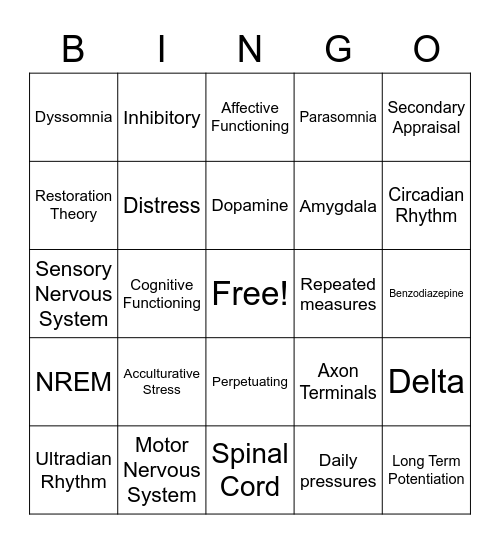

This bingo card has a free space and 90 words: Predisposing, Precipitating, Perpetuating, Protective, Cumulative Risk, Antecedent, Positive Reinforcement, Negative Reinforcement, Punishment, Response Cost, Conditioned Stimulus, Conditioned Response, Neutral Stimulus, Benzodiazepine, GABA, Dopamine, SCN, ARRM, Somatic NS, Parasympathetic NS, Sympathetic NS, Central Nervous System, Spinal Cord, Brain, Sensory Nervous System, Motor Nervous System, Jetlag, Sleep Wake Shift, Alpha, Beta, Theta, Delta, REM, NREM, Dyssomnia, Parasomnia, Affective Functioning, Behavioural Functioning, Cognitive Functioning, Circadian Rhythm, Ultradian Rhythm, Restoration Theory, Evolutionary Theory, Reconstruction, Recall, Axon Terminals, Dendrites, Lock and Key, Sensory memory, Short-term memory, Hippocampus, Amygdala, Cerebellum, Cerebral Cortex, Matched Participants, Independent Groups, Repeated measures, Counterbalancing, Confounding Variables, Extraneous Variables, Cross- sectional Study, Case Study, Self-report, Neurotransmitter, Neurohormone, Cortisol, Catastrophe, Daily pressures, Life Events, Major Stress, Acculturative Stress, Long Term Potentiation, Long Term depression, Excitatory, Inhibitory, Distress, Eustress, Fight-Flight-Freeze response, GAS, Stressor, Primary Appraisal, Secondary Appraisal, Coping Flexibility, Approach Strategy, Avoidance Strategy, Operant Conditioning, Observational Learning, Classical Conditioning, Explicit memory and Implicit Memory.
AP PSYCHOLOGY | AP PSYCHOLOGY | Learning Vocab Bingo | Learning Vocabulary | Chapter 10 Bingo!!!!
Share this URL with your players:
For more control of your online game, create a clone of this card first.
Learn how to conduct a bingo game.
With players vying for a you'll have to call about __ items before someone wins. There's a __% chance that a lucky player would win after calling __ items.
Tip: If you want your game to last longer (on average), add more unique words/images to it.